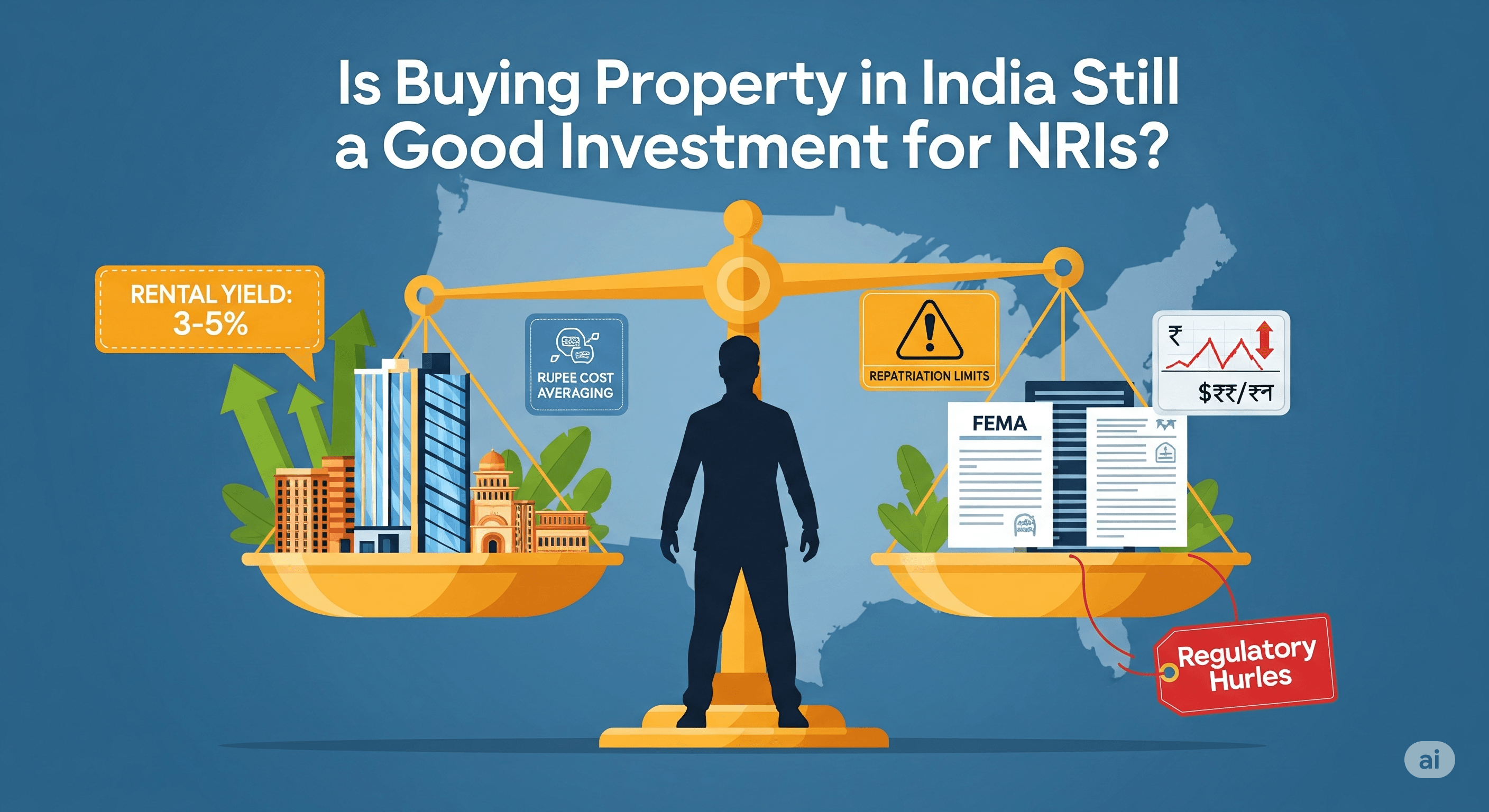For many Indian NRIs in the USA, the dream of owning a home back in India is a powerful one. It’s more than bricks and mortar—it’s a connection to roots, a base for family visits, and a cornerstone of a financial legacy.
But in the dynamic Indian real estate market of 2025, this emotional dream must be weighed against a critical question: Is it still a smart financial investment?
The answer is nuanced. Indian property can still deliver significant rewards but the days of guaranteed, skyrocketing returns are gone. A successful NRI investment in 2025 requires clear goals, due diligence, and risk awareness. This guide provides a balanced roadmap to help you make the right call.
The Big Picture: Pros vs. Cons of Investing in Indian Real Estate (2025 Snapshot)
Here’s a quick comparison table that captures both sides of the debate:
Pros | Cons |
| Emotional & cultural anchor for family and legacy | Low liquidity – difficult to sell quickly |
| Potential for long-term appreciation in growth corridors | Tenant & property management headaches from abroad |
| Rental income in INR provides steady cash flow | Legal hurdles with title deeds, encumbrance checks, RERA compliance |
| Tangible retirement asset in India | Market volatility – prices can stagnate or decline |
| Portfolio diversification beyond US equities | Currency fluctuation risk (USD/INR impacts returns) |
The Pros: Why It Can Be a Great Decision
- Emotional & Cultural Anchor: A base in India for visits or eventual return.
- Long-Term Growth Potential: Well-located properties in developing cities can appreciate over 5–10 years.
- Rental Income Stream: Generate passive cash flow in INR.
- Retirement Security: A home to live in during your golden years.
- Diversification: Reduces reliance on purely US assets.
The Cons: The Risks Every NRI Must Consider
- Liquidity Challenges: Selling property can take months.
- Management Issues: Handling tenants, repairs, and disputes remotely is stressful.
- Legal/Bureaucratic Complexity: Title, encumbrance, and registration paperwork require vigilance.
- Market Volatility: Not all Indian cities guarantee appreciation.
- Currency Risk: INR depreciation can erode your returns when converted back to USD.
The NRI Rulebook: Legal & Financial Must-Knows
What Type of Property Can You Legally Buy?
- ✅ Allowed: Any number of residential or commercial properties.
- ❌ Not Allowed: Agricultural land, farmhouses, or plantations.
How Can You Fund Your Property Purchase?
- Remittance from the USA: Send foreign earnings to India via normal banking channels.
- NRE/NRO Accounts: Use funds already parked in your NRE (repatriable) or NRO (non-repatriable) accounts.
- Home Loans from Indian Banks: NRIs are eligible, but need:
- PAN card
- Employment/Income proof
- Valid visa & passport
- Overseas address proof
Your Step-by-Step Action Plan for Buying Property from the USA
- Define Your ‘Why’
Is it for parents, retirement, or rental yield? Your purpose determines city, size, and budget. - Budget & Financing
- Decide cash vs. loan.
- Get loan pre-approval if considering a bank loan.
- Assemble Your Team
- Real estate agent (local, reputed).
- Lawyer (specializing in property).
- Extreme Due Diligence
- Clear Title Deed (no disputes).
- Encumbrance Certificate (no pending loans).
- RERA Registration for new projects.
- Execute a Power of Attorney (PoA)
- Appoint a trusted relative/professional in India to handle documentation.
- Sale Agreement & Registration
- Sign agreement → Pay stamp duty & registration → Property legally in your name.
The 2025 Market Snapshot: Key Trends to Watch
1. Rise of Tier-2 Cities
Cities like Pune, Hyderabad, Ahmedabad, and Coimbatore are attracting investors due to lower costs, IT parks, and infrastructure growth.
2. Demand for Gated Communities
Post-pandemic buyers prefer secure, amenity-rich complexes with open spaces, gyms, and 24/7 security.
3. Impact of Interest Rates
RBI’s stance on interest rates in 2025 is keeping home loan EMIs relatively stable, sustaining demand but moderating speculative price hikes.
Conclusion: Is the Dream a Smart Move for You?
The dream of owning a home in India is still alive for NRIs in 2025 but it’s no longer a “buy anything, make a fortune” game. Instead, it’s a strategic decision that blends personal emotion with financial prudence.
Today, property in India should be seen less as a quick-profit bet and more as a long-term anchor—your family’s base, your retirement nest, and a tangible tie to home.
👉 Your success will depend on rigorous due diligence, trusted local partners, and aligning the investment with your personal and financial goals.


